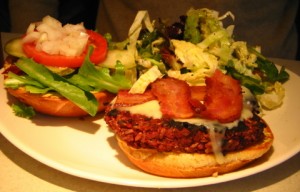 On Earth Day 2004 my friend Gabe invited me to go get an “amazing” veggie burger for free at a new restaurant on High Street in Columbus Ohio’s “Short North” Arts district called Northstar Cafe. At that point I wasn’t too keen on veggie burgers and I thought Gabe shared the sentiment, but given the favorable price and intriguing recommendation- I tagged along anyway.
On Earth Day 2004 my friend Gabe invited me to go get an “amazing” veggie burger for free at a new restaurant on High Street in Columbus Ohio’s “Short North” Arts district called Northstar Cafe. At that point I wasn’t too keen on veggie burgers and I thought Gabe shared the sentiment, but given the favorable price and intriguing recommendation- I tagged along anyway.
The veggie burger was amazing- filling, wonderful texture and taste- but the restaurant itself was astounding. Northstar was my first example of a universally appealing experiment in the collision of unlikely bedfellows : business with an inextricably linked environmental mission. Years before this burger…I broke up a year of studying accounting and international business, to spend the summer canvassing with environmental organizers. Back then it felt like dating two men who are each others’ mortal enemies. (Not that I’ve lived that, but we can all picture it, right?) At any rate, I hadn’t encountered many things that really challenged my “mortal enemy” assumption of the relationship between business and environmental stewardship until Northstar.
Certainly there are thousands of restaurants like Northstar on either coast but for this midwestern girl, it was a first. Northstar was trendy, packed, delicious, and the sustainable aspects I loved most were visible primarily to those primed to see them. The primary benefit offered was delicious food.
It wasn’t until Brad, another good friend of mine, started working at the restaurant and befriending the owners that I experienced a fuller picture of what was going on at this place. Â The owners made every decision carefully, honoring the complexity associated beyond, but inclusive of, the economic bottom line. They recommended the books like “Cradle to Cradle” to their employees, donated 1% of all sales to the Ohio Ecological Food and Farm Association, sourced a great deal of their ingredients locally and organically, and so on. Two more noteworthy facts: their first year they didn’t spend a thing on marketing, yet enjoyed remarkable sales for a startup AND their employee roster included a fair amount of professionals who left higher-paying jobs or recent graduates who forewent higher-paying jobs to work at the Cafe.
I remember feeling how the blind man must have felt in this scene from Amelie when I learned that the folks behind the cash register were former nurses and future professors.
Like Amelie to the blind man, my Northstar experience helped me to Really See and Feel a waterfall of world-saving energy possible in business. I was arguably waiting to see something like this after working a couple+ years with corporate and public accountants. Despite the noble work of the accounting profession, most accountants I met, including the one in the mirror, were disconnected from the value their work provided to the world. I had hope that Sarbanes Oxley, despite its imperfections, would awaken this energy-generating connection for the profession as it was a pervasive, externally-imposed reminder that what we did mattered greatly outside the accounting department. It certainly mattered to the folks at Enron and World Com who lost their retirements. Needless to say, the SOX messaging was rarely translated this way and, perhaps as a consequence, the first years of compliance were grueling for all. SOX= more things on the to do list.
Shortly after my Earth Day burger I realized that the giant change to foster sustainable enterprise was the next SOX in business. Shall we say SOX if overdosed on steroids to conjure an image more appropriate to scale. I also started to wonder “how can businesses respond to the call for sustainable enterprise differently, more effectively, more optimistically?” My hunch is/was that the stakes were too high to employ the SOX model of change: Uninspiring or unclear framing of change –> annoyed employees –> molasses speed progress. I mustered courage and left accounting to appease this new curiosity about HOW organizations change and appease stirring passion for saving the world through sustainable enterprise.
Flash forward 5 years and two degrees later and it seems my affiliation to the characters in the scene from Amelie has flip-flopped. It is my calling to be the metaphorical Amelie to the metaphorical blind man. I want help organizations to see the latent power available to forge ecological sustainability and heart-pounding, human flourishing in business by adding man’s innate connection to nature and drive for challenge, compassion, and meaning to the list of assumptions we make about behavior in management. How different will strategy, management, etc look with these assumptions?
All because an invite to eat a free veggie burger on Earth Day… beyond grateful
